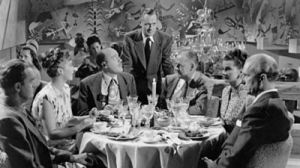STUDIO: Criterion | DIRECTOR: Robert Montgomery | CAST: Robert Montgomery, Thomas Gomez, Wanda Hendrix, Fred Clark, Andrea King, Art Smith
RELEASE DATE: 3/17/15 | PRICE: DVD $29.95, Blu-ray $39.95
BONUSES: audio commentary by film historians Alain Silver and James Ursini; interview with film historian Imogen Sara Smith; “Lux Radio Theater” adaptation of the film
SPECS: NR | 101 min. | Thriller | 1.37:1 aspect ratio | mono
While he’s best known today as the father of Bewitched’s Elizabeth Montgomery, Robert Montgomery was a major star in the Thirties and Forties who excelled in both romantic comedies and creepy-killer dramas like Night Must Fall. He was also an ambitious and talented director who made six films, with the 1947 Latin-tinged noir Ride the Pink Horse definitely rating as the best.
The plot is a classic noir scenario: low-down gangster Lucky Gagin (Montgomery) has a clearly ill-fated crime in mind — to carry on a murdered friend’s blackmail scheme against a powerful criminal (Fred Clark). In this instance the setting is an exotic one: a small town in New Mexico during fiesta. The particulars of the blackmail scheme aren’t important (they are explained in a few stray lines of dialogue), it’s the fact that our hero is committing a crime that will either get him caught or killed.
As a director, Montgomery made excellent choices for Pink Horse. The cast includes a terrific array of familiar faces, most especially Thomas Gomez (Force of Evil) as the Mexican owner of a merry-go-round (hence the title) who becomes Gagin’s ally. Wanda Hendrix is the “good girl,” a Mexican-Indian teen who aids and ultimately saves our antihero (but interestingly never becomes his lover), while Andrea King is the bad girl who proposes a much more ambitious blackmail scheme to fleece Clark’s character (who also happens to be her boyfriend).
 Another decision that made Pink Horse as compelling as it is was the choice of Russell Metty (All That Heaven Allows) as cinematographer. Metty did much utilitarian work on standard potboilers, but his work with Orson Welles and Douglas Sirk demonstrated his ability to create moods through composition and lighting.
Another decision that made Pink Horse as compelling as it is was the choice of Russell Metty (All That Heaven Allows) as cinematographer. Metty did much utilitarian work on standard potboilers, but his work with Orson Welles and Douglas Sirk demonstrated his ability to create moods through composition and lighting.
The film’s script is a tight, no-nonsense affair by master-scribes Ben Hecht (Notorious) and Charles Lederer (His Girl Friday) that emphasizes Gagin’s tough-as-nails world view as well as his penny-ante status as a gangster. A pungent monologue near the end of the film delivered by Clark outlines the rift between the lower and upper classes, both in society and crime. Gomez’s character summarizes it more succinctly when he tells Gagin, “We all same kind of peoples – we all born for be broke….”
The DVD extras include analyses of the film by noir experts that do much to situate the film in the noir canon and highlight its more complex aspects. In an onscreen interview film historian Imogen Sara Smith discusses Pink Horse as a “non-urban noir” and examines the trajectory of Gagin from classic tough-guy to “sleepwalker” who needs to be protected by the Mexican characters.
In a thorough audio commentary, film historians Alain Silver and James Ursini compare the film to its source novel by Dorothy B. Hughes (In a Lonely Place). They also explore the participants in-depth, including producer-uncredited coscripter Joan Harrison, who was best known for her TV work with Hitchcock.
Silver and Ursini emphasize the importance of “hostility between races and classes” that characterizes the film. Interestingly, no one mentions that Montgomery’s oft-hammy “hard-berled” voice frequently sounds like Richard Widmark’s “Tommy Udo” character in Kiss of Death (released the same year as Pink Horse).
|
Buy or Rent Ride the Pink Horse
|
|||
|---|---|---|---|
DVD |
 |
||
Leave a Reply